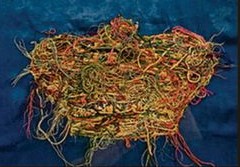The Sunday Sermonette – Tied in Knots.

The gentle, methodic ticking and rich, melodic chimes of antique clocks can provide a sense of comfort and add an air of security to their surroundings. Such was the case in the clock and watch shop of Casper ten Boom, once located in the city of Haarlem, Holland. But his sense of security was shattered on the frigid morning of February 28, 1944, when he and his family were arrested by the Gestapo. His crime? Hiding Jewish refugees and members of the Dutch Resistance in his home above his watch shop. Ten days after his arrest, Casper was dead. However, one of his daughters would live to tell the tale of their family’s trials and tribulations during the war. Her name? Corrie ten Boom.
Corrie and her sister, Betsie, were eventually sent to the infamous Ravensbrück concentration camp. An all-women’s camp, its seemingly inhuman male commandant and his female guards had no pity for those in the camp. As one inmate said: “They didn’t shoot the women. We were to die of misery, hunger, and exhaustion…when we arrived at Ravensbrück, it was the worst. The first thing I saw was a cart with all the dead piled on it. Their arms and legs hanging out, and mouths and eyes wide open. They reduced us to nothing. We didn’t even feel like we had the value of cattle. You worked, and you died.”
Corrie and Betsie were at the guard’s mercy as well. They suffered from extreme hunger, dangerous work assessments, and brutal beatings from the female guards. Amid their agony, they attempted to hold onto their humanity by holding worship services after a hard day’s work, reading from a Bible they had somehow managed to hold onto during the guard’s vicious searches of their barracks. But many nights after the Bible reading, Corrie, covered with lice and lying on a bed of straw and planks, could not help but ask why all this was happening to her and her beloved sister.
Due to the horrendous work conditions and the bitter weather, Betsie’s health began to deteriorate. Corrie did all she could to nurse her, but Betsie died on a biting cold December’s day, 1944. Before she died, she told Corrie, “There is no pit so deep that He (God) is not deeper still.” Twelve days later, Corrie was released. Afterward, she learned that her release was due to a clerical error and that a week later, all the women in her age group were sent to the gas chambers.
In the months following her release, Corrie struggled with her faith in God. Why was her God-fearing, Christian family decimated? Why didn’t God save Betsie? Why was her life now nothing more than a knotted pile of endless knots? But time heals all wounds. Corrie eventually realized that the knots in her life had actually strengthened her faith in God. She learned that those who trust God are not exempt from trouble, sickness, or pain. We, too, can learn from life’s knots—they can help us rediscover God, which is what happened to Corrie.
For the rest of her life, she gave sermons about God’s faithfulness: “We cannot see what He sees. He is always working for our good and His glory. We must resolve to trust God’s perspective.” She held an embroidered cloth throughout her sermons, showing the audience its backside, a jumbled wad of knots. Then, looking sweetly into the eyes of her audience, she would turn the cloth around and say, “Although the threads of my life have often seemed knotted, I now know, by faith, that on the other side of the embroidery…there is a Crown.”
The promise of one day receiving that Crown should encourage us to stay strong, keep the course, and remain faithful amid hardships, death, grief, and physical and mental pain. Corrie’s embroidered cloth is displayed at the Corrie ten Boom Museum in Haarlem, Holland.
Ponder this and go forth.

